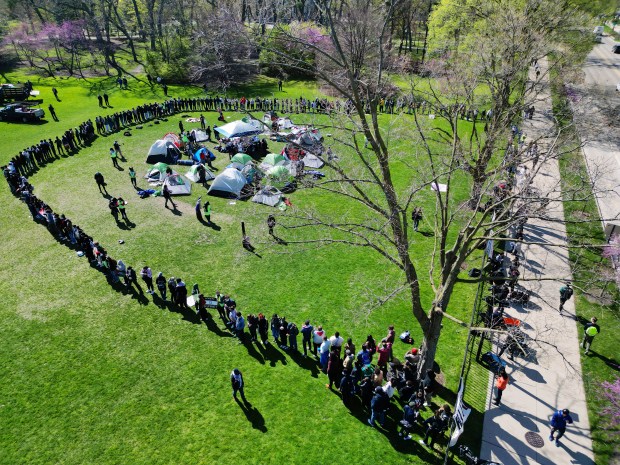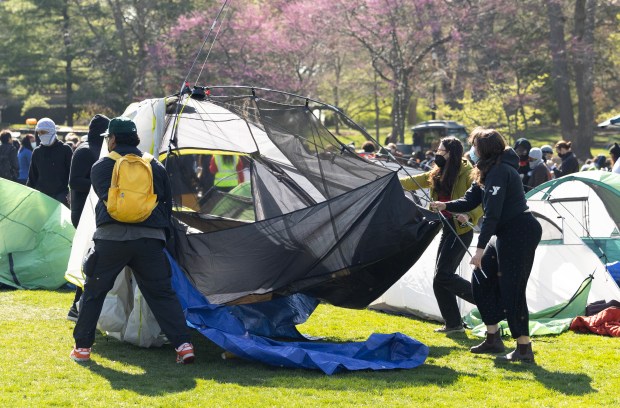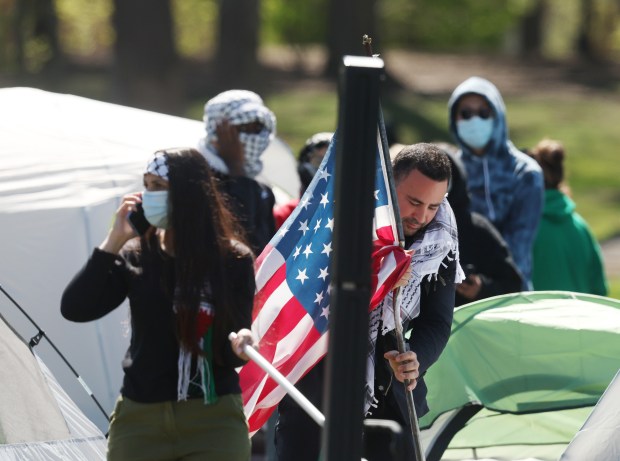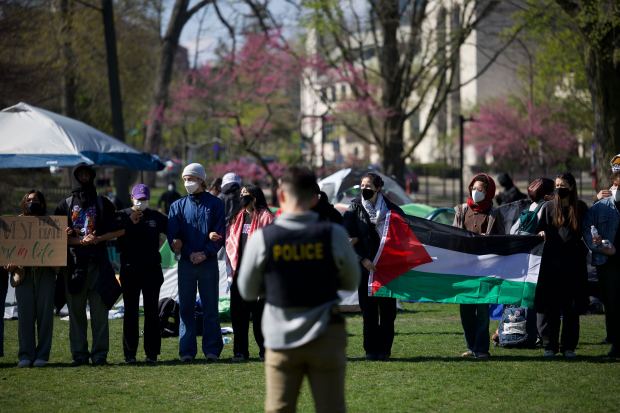Hundreds of Northwestern students joined nationwide protests against Israel’s war in Gaza on Thursday, prompting school administrations to abruptly change campus policies and ban tents or other temporary structures in previously public spaces.
University President Michael Schill informed students of the policy change just after 9 a.m. in an email.
“The goal of this addendum is to balance the right to peacefully demonstrate with our goal to protect our community, to avoid disruptions to instruction and to ensure University operations can continue unabated,” Schill said in the email.
Students in violation of the new policy risk suspension, expulsion or criminal proceedings, according to a statement posted on the university’s website.
The announcement didn’t deter the protesters.
By mid-Thursday morning, more than a dozen flimsy camping tents stood in the middle of the university’s flagship campus in Evanston. A canopy sat in the middle, with a table full of food under it and several grills nearby.
“Northwestern students faculty and staff are putting their bodies, education and jobs on the line to stand with the Palestinian people.” organizers wrote in a statement circulated before the protest.
A few hundred students linked arms to form a barricade around the tents as uniformed Northwestern University police officers stood a few yards back, watching students chant “Free, free, Palestine” and other pro-Palestinian messages.
President Schill said some demonstrators took down tents earlier that morning after discussions with university police, but others who refused were issued citations.
The tent encampment on Northwestern’s Deering Meadow is in line with large, and at times violent, protests that have swept college campuses across the country this week in support of Palestine amidst the war in Gaza.
The Northwestern University Police Department was quick to address the growing crowd early Thursday morning.
Northwestern students are asking for the university administration to publicly disclose where the university invests and divest from funding weapons for Israel.
“We pay $100,000 here to go here and that’s $100,000 that could be going straight to God knows where and the university does not disclose that information, which is just unacceptable,” said a Northwestern undergraduate student, who was a lead organizer for Thursday’s protest. She declined to disclose her name to the Tribune for fear of retribution from the university.
Students began setting up tents as early as 7 a.m. Videos circulated on social media show uniformed police threatening to remove tents and arrest students for breaking university policies.
The lead student organizer said several police cars surrounded the students, which she said was an “unnecessary” and “outrageous” reaction to free speech on campus.
As of noon, no students had been arrested by university police, students said.
According to students, police tried to disperse the crowd by saying they needed a “reservation” to demonstrate on the quad and use a bullhorn, as outlined in the less than 12-hour-old policy.
“The University is in active discussions with the demonstrators to ensure the safety of members of the Northwestern community while also providing a space for free expression,” Jon Yates, vice president for global marketing and communications at Northwestern University said in an email to the Tribune.

A Northwestern student participating in the protest said he was unaware of the protest policy change but was not surprised as widespread media attention has focused on college campus protests around the country.
The encampment was mostly peaceful after police backed up, allowing the tents to stay on the quad. Tensions rose briefly when a protester walked up to a man holding American and Israeli flags across the street, stealing the flags and taking them back to the tents.
The man, who said his name was John Brinkmann, approached the students asking for discourse and for the return of his property. Northwestern police did not intervene as the students refused to give them back.
Outside a fence separating the encampment from the sidewalk, sophomore Jeremy Berkun stopped with two friends to watch the scene.


Berkun, a Jewish student, said he was disappointed in the dialogue on campus between students.
“It’s clear that the university and the student body is very, very against Israel at the moment,” he said. “And I just wish that there was a little bit more dialogue amongst the Jewish students here who feel very connected to that land and to the nation that has kept us safe.”
Behind Berkun, a rabbi consoled a girl in tears.
In a statement shared on social media, Northwestern Hillel, the university’s Jewish center, said the encampment reflected “a disturbing and quickly escalating trend of anti-semitic rhetoric and actions both nationally and on our own campus.”
The university’s South Asian Student Association said on Instagram the group was moving the location of a Saturday Holi celebration, originally scheduled to be held on Deering Meadow, to support the encampment protest.



